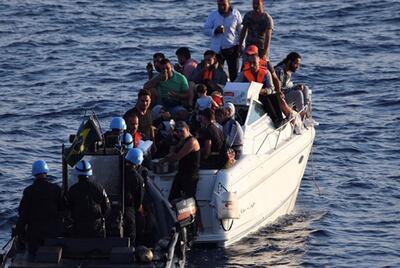Khaled Nejmeh was just five years old when he drowned off the coast of Lebanon as his family made a desperate bid to reach Cyprus by boat this September.
Unlike Alan Kurdi, who sparked a global debate about the risks refugees take to reach Europe after his small lifeless body was photographed washed ashore on a Turkish beach in 2015, Khaled’s death went almost unnoticed and provoked no international outrage.
Most Lebanese media outlets reported his death but not his name, relying on a statement published by the army after the rescue of 40 Syrian, Lebanese and Palestinian survivors.
Thousands have died making the perilous crossing from North Africa to Italy and from Turkey to Greece, but Khaled’s death sheds light on the long and deadly sea route which has long promised a direct escape from Lebanon.
In Lebanon, Syrian refugees live in desperate conditions. Nearly 1 million Syrian refugees are registered with UNHCR in the country, though local authorities argue that the number of Syrians is as high as 1.5 million. Over 70 per cent live under the poverty line, according to the latest UN reports. There’s a lack of work opportunities, donor fatigue and increasing intimidation by Lebanese security and local authorities pushing Syrians to return.
“Syrians are in a catch 22 situation,” says Nasser Yassin, Director of research at the Issam Fares Institute for Public Policy at the American University of Beirut. “They can’t be integrated in Lebanon, many can’t go back to Syria and leaving by sea is dangerous.”
While some have returned to Syria, others risk their lives to leave a country where they struggle to get by day to day let alone think of long-term prospects.
The sea route is the only option for Syrians who can’t travel legally by plane and fear returning to Syria. Between January and October 19, 2018, some 442 Syrians arrived in Cyprus by boat, according to the UNHCR. They came “mainly from Turkish shores and a fewer from Lebanon,” said Emilia Strovolidou, a public information officer at UNHCR in Cyprus.
Sensitive to bad press, Lebanese authorities are reluctant provide estimates for how many refugees are fleeing their shores in this way.
__________________
Read more:
Lebanon in no mood to celebrate independence day
Activists mourn Raed Fares, 'one of the last free brave voices' in Syria
With two still missing in Syria, Jordanians wary of using Nassib crossing
__________________
Samer had successfully made the illegal journey to Cyprus once before however. In July, he made the trip alone, but after several months work painting houses, returned and paid a Syrian smuggler $2,200 to make the trip again with his Palestinian-Lebanese wife Nivine, Khaled, and eight-year-old daughter Dalal.
The open boat left Lebanese shores north of Tripoli in the middle of the night. Shortly afterwards the heavily laden boat capsized in the waves. It wasn’t until dawn that Palestinian fishermen from the nearby camp of Nahr Al Bared spotted them and alerted rescuers. Khaled’s body was found trapped under the overturned boat.
Back in Tripoli, his corpse – still wearing a lifejacket – was taken to the morgue while his parents were imprisoned for several days. When they were finally able to retrieve his body, they had to bury him illegally. Cemetery plots for Syrians are increasingly hard to find in Lebanon.
Local authorities strongly discouraged the family from speaking to the media. This was to avoid harming Lebanon’s reputation, Khalid’s 33-year-old father, Samer said.
Lebanese General Security declined to discuss the case in detail.

Angered by what he sees as unfair at the hands of the Lebanese authorities, Samer has decided to speak out. “They say I’m making up stories,” about his detention and difficulty of burying his son, “but I’m just talking about what happened to me,” he says.
The family says that the attempt has left them penniless and harassment by the Lebanese authorities since has put them in a worse position than before they tried to leave. Unable to pay rent, they have become homeless and are moving between the homes of friends and family members.
When The National spoke to the family in October, they were staying with Samer's sister in the Palestinian camp of Baddawi, near Tripoli. Lebanon's Palestinian camps are beyond the reach of Lebanese authorities and Samer is trying to avoid being detained again. "They say they need to continue investigating my son's death. But I didn't do anything wrong", her said between drags on a cigarette.
Meanwhile, the family’s condition in Lebanon is increasingly perilous. Samer says he hasn’t received any help from UNHCR, even though he registered with them when he arrived from Syria in late 2011. A UNHCR representative in Beirut was unavailable to comment.
Samer says that going back to Syria is not an option, despite returns organised by Lebanese authorities in coordination with Damascus. His younger brother Ahmad says he was imprisoned for four months in 2012 by Syrian Military Intelligence's infamous Palestine Branch – one of the most feared detention facilities in Syria – after returning from Lebanon to Syria to sort out some paperwork. "We were tortured with electricity and beaten," says Ahmad, lifting his T-shirt to reveal a scarred torso.
Even if they are not arrested upon their return, the brothers would likely be conscripted into the army. “If I’m not considered a terrorist, I’ll have to show my loyalty to the regime by fighting on the frontline where I will be killed,” Samer said.
Even as the weather changes and the sea gets rougher, refugees are continuing trying to reach Cyprus. In early November, Lebanese police intercepted a boat leaving Tripoli and arrested 32 Syrians, including children, as well as several identified as smugglers.
Despite Khaled’s death, Samer is again saving money to smuggle his family out of Lebanon.
“People say I’m mad to take such a risk,” he says. “If I were happy here, of course I wouldn’t do this.”


